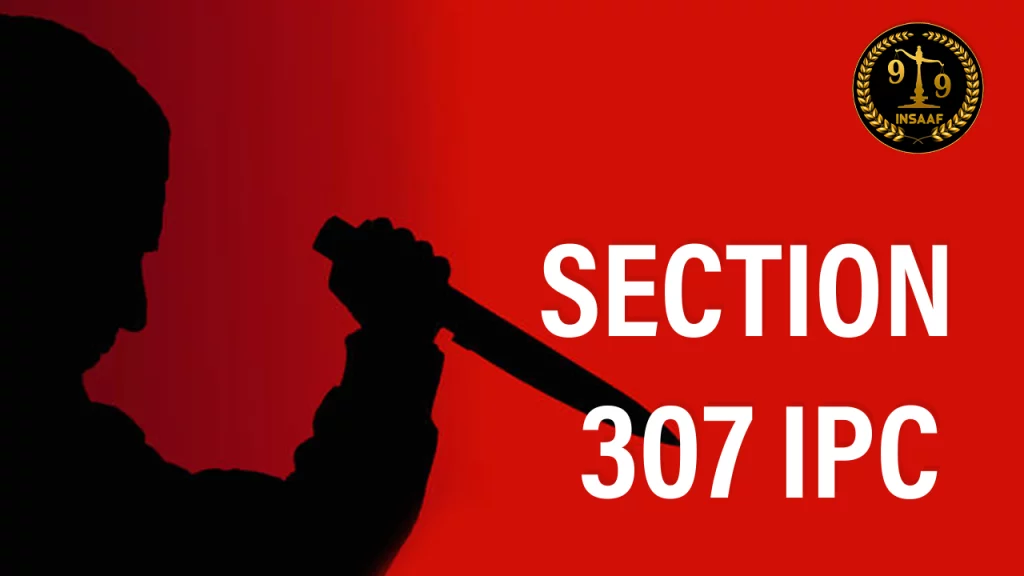
The Indian Penal Code (IPC) is one of the main pillars of the Indian judicial system. The IPC helps in addressing many offenses and deciding the consequences of these offenses. One of the key sections of IPC is Section 307, this section deals with grave offenses like attempts to murder. Let us explore the Section 307 IPC its scope, complexity, punishment and the critical question of whether it is a bailable or non-bailable offense.
Decoding Section 307 IPC: Attempt to Murder
Section 307 of the Indian Penal Code (IPC) delves into the complex issue of “attempt to murder,” a concept that requires more than mere reflection. This section applies when a person takes a dangerous action toward taking the life of another. The prime focus under this offense is on the crucial role of intent. This offense is motivated by mal intent, not just malice, and it calls for a clear and deliberate intent to terminate a life. Moreover, the distinction between preparation and imminent effort is crucial. Preparation entails planning, whereas an immediate attempt denotes rapid, determined action intended to cause damage. The prosecution must prove that the defendant had a conscious and deliberate intent to murder another person. The law’s vigilance in delineating and distinguishing these elements demonstrates its dedication to protecting life and maintaining social order.
Brief Overview of Section 307 IPC Punishment And Penalties
As a deterrent against acts that endanger life, Section 307 of the Indian Penal Code carries a life sentence for attempted homicide. The severity of punishment varies depending on factors such as premeditation, injuries inflicted, and the accused’s past. Those convicted of attempted homicide face life in prison or a term that can extend to ten years, along with a fine. Recognizing varying degrees of intent, the penalties ensure individualized justice. The penalties acknowledge the varying degrees of intent and the level of threat posed to the victim’s life. The core of section 307 of the Indian Penal Code is a measured approach that combines the gravity of the offense with contextual fairness, protecting life while upholding the principles of proportional accountability.
Section 307 IPC Bailable Or Non Bailable Offense:
Bailable offenses enable pre-trial release unless proven guilty. The possible threat to society and the requirement for comprehensive analysis before granting bail make non-bailable offenses more rigorous. Understanding the distinction between bailable and non-bailable offenses has crucial implications for personal liberty. Section 307 IPC, which encompasses attempted murder, typically falls under the category of non-bailable offenses due to its severity and propensity for posing a danger to society. This emphasizes the delicate equilibrium between individual rights and group safety. Bail is discretionary in non-bailable cases, with the court considering factors such as evidence strength and societal risk. In this delicate situation between liberty and responsibility, the law upholds the essence of justice by guaranteeing comprehensive evaluation while protecting the principles of equity and order.

Balancing Scales: Justice and Liberties in Section 307 IPC Matters
While it is important to hold those responsible for crimes like those covered by Section 307 IPC (attempted murder) accountable, it is also important to protect the rights of people who have been accused of committing such a crime. Justice and individual rights must be balanced in a fair legal system. This balance recognizes that justice weighs society and the accused. In non-bailable offenses like attempted murder under Section 307 IPC, justice must be balanced.
Thorough judicial review is crucial. The court considers the evidence and social risk before granting bail. This inspection ensures accountability and individual rights. The process also maintains social cohesion by delivering a clear message that serious infractions will be punished.
The legal system works best when justice is done without compromising individual rights. This delicate balance shows a society’s dedication to fairness and order. The process protects the accused and society, restoring trust in the justice system.
Summing it Up: Reflecting on The Rights & Responsibility Under Section 307 IPC
Section 307 IPC legalizes life’s fragility and our society’s values. Legal experts and laymen must understand this section, its fines, and bail provisions. Justice and accountability are shaped through legal interpretation and application in a dynamic society.
In summary, Section 307 IPC shows the delicate balance between individual rights and social well-being. Its presence reminds us of the law’s vigilance in protecting life and justice, and its meticulous application shows the maturity of a legal system attempting to strike the right balance between liberty and responsibility.
Unlocking Legal Solutions: How Insaaf99 Helps You 307 IPC Cases By Providing Expert Guidance at Your Fingertips
In the world of legal complexities, Section 307 IPC, dealing with attempted murder, demands specialized understanding. Insaaf99, an online legal consultation firm, plays a pivotal role in guiding individuals through such intricate cases. With a pool of experienced legal experts, Insaaf99 offers tailored advice, clarifying the nuances of Section 307 IPC. Whether deciphering the intent element, assessing penalties, or understanding bail provisions, Insaaf99 provides real-time consultations that demystify the legal intricacies. The platform’s accessibility ensures swift guidance, empowering individuals facing Section 307 IPC charges to make informed decisions. Insaaf99 bridges the gap between legal expertise and those in need, ensuring that justice is comprehensible and attainable, even in the most complex legal scenarios.
FAQ:
What is Section 307 IPC?
Section 307 IPC is a legal provision that addresses the offense of attempted murder, encompassing intentional actions aimed at causing the death of another person.
Is Section 307 IPC a bailable or non-bailable offense?
Section 307 IPC is generally considered a non-bailable offense, meaning that the accused typically cannot obtain bail from the police station and must seek bail from the court.
What are the penalties and punishment for Section 307 IPC offenses?
The penalties for Section 307 IPC offenses include imprisonment for life, reflecting the gravity of the crime. The extent of punishment depends on factors like premeditation, inflicted injuries, and the accused’s criminal history.

 CALL NOW +91 – 8800110989
CALL NOW +91 – 8800110989